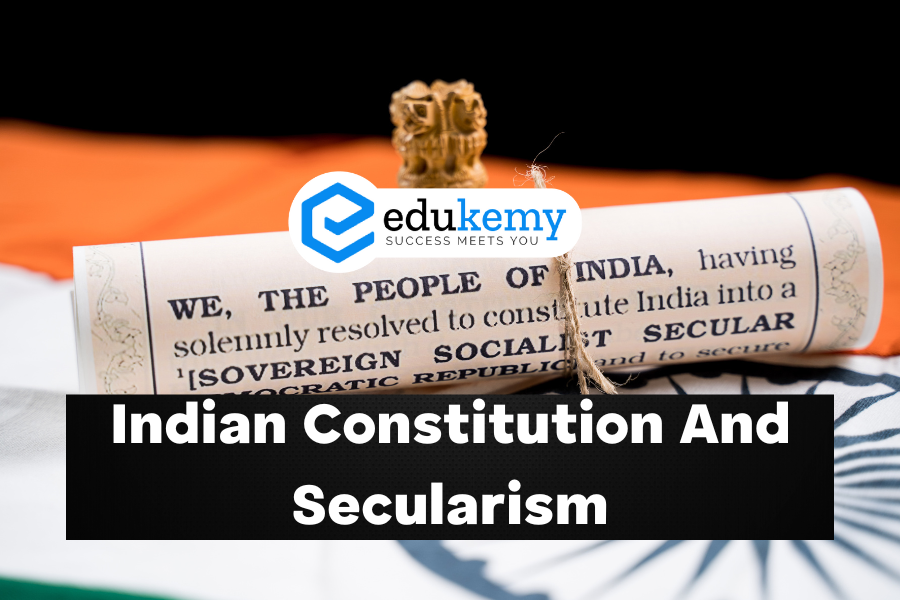
The Indian Constitution, adopted on January 26, 1950, is not merely a legal document but the foundational framework of the world’s largest democracy. At its heart lies the principle of secularism, a cornerstone that upholds the nation’s commitment to equality, religious freedom, and social harmony. Embedded within its pages is a vision of a nation where individuals of all faiths and beliefs coexist peacefully, where the state remains impartial to matters of religion, and where every citizen enjoys the right to practice, profess, and propagate their religion without fear or favor. Secularism in the Indian context is not merely the separation of religion and state, but a profound commitment to pluralism and inclusivity, reflecting the rich tapestry of cultures, religions, and traditions that define this vibrant nation.
Contents
- 1 Indian Constitution And Secularism
- 2 FAQs
- 2.1 Q: What is the Indian Constitution?
- 2.2 Q: What is secularism according to the Indian Constitution?
- 2.3 Q: How does the Indian Constitution ensure secularism?
- 2.4 Q: Does secularism mean the absence of religion in Indian society?
- 2.5 Q: Can the Indian Constitution be amended to change its secular nature?
- 3 In case you still have your doubts, contact us on 9811333901.
Indian Constitution And Secularism
- There is a clear incorporation of all the basic principles of secularism into various provisions of constitution.
- The term ‘Secular’ was added to the preamble by the forty-second constitution Amendment Act of 1976, (India is a sovereign, socialist, secular, democratic, republic).
- It emphasise the fact that constitutionally, India is a secular country which has no State religion. And that the state shall recognise and accept all religions, not favour or patronize any particular religion.
- While Article 14 grants equality before the law and equal protection of the laws to all, Article 15 enlarges the concept of secularism to the widest possible extent by prohibiting discrimination on grounds of religion, race, caste, sex or place of birth.
- Article 16 (1) guarantees equality of opportunity to all citizens in matters of public employment and reiterates that there would be no discrimination on the basis of religion, race, caste, sex, descent, place of birth and residence.
- Article 25 provides ‘Freedom of Conscience’, that is, all persons are equally entitled to freedom of conscience and the right to freely profess, practise and propagate religion.
- As per Article 26, every religious group or individual has the right to establish and maintain institutions for religious and charitable purposes and to manage its own affairs in matters of religion.
- As per Article 27, the state shall not compel any citizen to pay any taxes for the promotion or maintenance of any particular religion or religious institution.
- Article 28 allows educational institutions maintained by different religious groups to impart religious instruction.
- Article 29 and Article 30 provides cultural and educational rights to the minorities.
- Article 51A i.e. Fundamental Duties obliges all the citizens to promote harmony and the spirit of common brotherhood and to value and preserve the rich heritage of our composite culture.
FAQs
Q: What is the Indian Constitution?
A: The Indian Constitution is the supreme law of India, drafted by the Constituent Assembly and adopted on January 26, 1950. It lays down the framework that defines the political principles, establishes the structure, procedures, powers, and duties of government institutions, and sets out fundamental rights, directive principles, and the duties of citizens.
Q: What is secularism according to the Indian Constitution?
A: Secularism in the Indian context means the state maintains an attitude of neutrality towards all religions. It neither promotes nor discriminates against any particular religion. The Indian Constitution enshrines secularism as one of its fundamental principles, ensuring equal treatment of all religions and religious communities.
Q: How does the Indian Constitution ensure secularism?
A: The Indian Constitution ensures secularism through various provisions such as the freedom of religion (Article 25-28), which guarantees individuals the right to profess, practice, and propagate religion freely. Additionally, it prohibits discrimination on the grounds of religion (Article 15) and mandates the state to maintain equality among all religions.
Q: Does secularism mean the absence of religion in Indian society?
A: No, secularism in the Indian context does not mean the absence of religion. Instead, it means that the state treats all religions equally and does not favor or discriminate against any particular religion. Citizens are free to practice and profess their religion without interference from the state.
Q: Can the Indian Constitution be amended to change its secular nature?
A: While the Indian Constitution can be amended, its basic structure, including the principle of secularism, cannot be altered. The Supreme Court of India has held that secularism is part of the basic structure of the Constitution, which cannot be amended even by Parliament’s amending power under Article 368.
In case you still have your doubts, contact us on 9811333901.
For UPSC Prelims Resources, Click here
For Daily Updates and Study Material:
Join our Telegram Channel – Edukemy for IAS
- 1. Learn through Videos – here
- 2. Be Exam Ready by Practicing Daily MCQs – here
- 3. Daily Newsletter – Get all your Current Affairs Covered – here
- 4. Mains Answer Writing Practice – here

